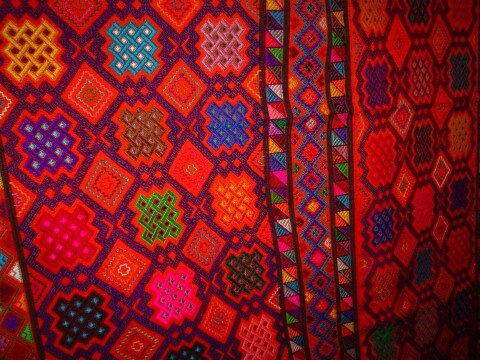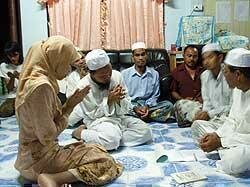BROWSE COUNTRIES/ TERRITORIES
The Israeli-Palestinian Numbers Game
Two races living under existential threats have created a climate of injustice for the Israeli-Arabs, where the law under which they live, is now being turned against them. In East Jerusalem, they are finding themselves being squeezed out of the very place they are claiming as their capital in a final two-state solution.

(For the purposes of clarity, the Arab-Israeli population in Jerusalem with Israeli identification will be named as “Arabs” and Palestinians in the occupied West Bank as “Palestinians”. It should however be noted that Israeli-Arabs also call themselves Palestinians and consider “Israeli-Arabs” as an occupational term used by Israel.)
When the State of Israel was established in 1948, it was to serve as a homeland and refuge for Jews, a historically-persecuted people, who had less than a decade ago, been massacred in the Holocaust.
The threat of extermination remained in the consciousness of Jews, as they established the State of Israel in 1948, and still does now. Today, politicians and academics alike continue to pore over Israel's viability, particularly as a Jewish State. Some estimate that the Jewish population may by 2050, in less than two generations, find itself in the minority in Israel.

The shadow of history looms large here in Jerusalem and Israel for both Jews and Arabs, just like that of this tree along the walls of Old City.
An existence among an Arab majority and Arab countries with whom it either has a cold peace – like Egypt – or none at all, is a scenario that the Israeli government is desperate to avoid. It is clearest perhaps in the divided city of Jerusalem and the nearby West Bank.
Looking first at Jerusalem, which Israel considers as its undivisible capital and part of which the Palestinians are claiming as their capital.
According to latest estimated figures from the Palestinian Authority, the Arab population in Jerusalem stands at just over 373,000. The figures cited by the Jerusalem Municipality put the Arab population in Jerusalem at 268,000 and the Jewish/non-Arab at 429,000.
A quick calculation gives the Jewish population a 60 to 65% majority.
Taking into consideration now the West Bank which has a Palestinian population of 2.432 million - according to latest estimates by the Palestinian Authority - this brings the total Arab population in Jerusalem and the West Bank to 2.805 million. Birth rates among Jews and Arabs are put at 2.7 and 4 respectively.
By 2020, there could conceivably be 6 million Jews and 2 million Arabs living in the State of Israel. Projecting to mid-century, some researchers believe that the State of Israel will lose its majority, bearing in mind there are still 3 million Palestinians living outside of Israel, in Lebanon, Syria and Jordan, waiting to return.
Having foreseen this potential threat to Jewish majority, successive Israeli governments since 1967 - when Jerusalem was annexed from Jordan and unified under the State of Israel – have taken steps to avoid it.
In Separate and Unequal: the Inside Story of Israeli Rule in East Jerusalem by Amir Cheshin et al, an advisor to two Jerusalem mayors, Teddy Kollek and Ehud Olmert,
“(In 1967), Israel’s leaders adopted two basic principles in their rule of East Jerusalem. The first was to rapidly increase the Jewish population in East Jerusalem. The second was to hinder growth of the Arab population and to force Arab residents to make their homes elsewhere.
“ ...In Jerusalem, Israel turned urban planning into a tool of the government, to be used to help prevent the expansion of the city’s non-Jewish population... Israel saw the adoption of strict zoning plans as a way of limiting the number of new homes build in Arab neighborhoods, and thereby ensuring that the Arab percentage of the city’s population – 28.8 in 1967 – did not grow beyond this level.
“The idea was to move as many Jews as possible into East Jerusalem, and move as many Arabs as possible out of the city entirely. Israeli housing policy in East Jerusalem was all about this numbers game.”
Sadly Israel's perceived threat to its existence has created an unjust situation particularly for the Palestinians living in East Jerusalem, with harsh measures to restrict the population and growth of the Arab population there
A UN report released in April stated that Arabs (which the report calls Palestinians) can construct homes on only 13% of East Jerusalem. They are allowed to apply for permits from the Jerusalem Municipality, which can be difficult to come by. The reports adds that
“... Because of the difficulties Palestinians encounter trying to obtain building permits from Israeli authorities, and due to the lack of feasible alternatives, many Palestinians risk building on their land without a permit in order to meet their housing needs. At least 28 percent of all Palestinian homes in East Jerusalem have been built in violation of Israeli zoning requirements.”
Hussein Qunbar is one of those who have violated zoning requirements.
A father of six, he wanted to construct additional units for each of his children and their families. He applied to the Jerusalem Municipality for 1000 square metres and was allotted him 300. The license for this cost him US$ 45,000. With six families for each of his offsprings and a modest estimate of three children per family, it meant that space would needed for 30 persons. With 300 square metres, each person presumably had a living space of 10 square metres, which might be sufficient for a single bed, a wardrobe and some walking room.
Since the allotted space was not enough for his purposes, Qunbar went ahead and built six apartments. He was then taken to court by the Municipality, had two of the apartments shuttered and will be paying 800 shekels in fine for 143 months, which totals to about 114,400 shekels or US$27,000.
For many ordinary Arabs less well-off than Qunbar, these are exorbitant amounts. The cost of a permit could cost an average of US$25,000. Add tot that the fines if they do build illegally, which could bankrupt them, and potentially leading them to lose their houses.
Ziad Hammoury is an Israeli-Arab lawyer and Director-General of the Jerusalem Centre for Social and Economic Rights, who deals on a daily basis with Arabs found in violation of building permissions in East Jerusalem. According to him, penalties imposed by the court are fines, prison, or house seizures or demolitions, and sometimes all three.
Palestinian society is such that extended families tend to live together, creating a need for more space as the clan grows. While it is true that the Palestinians have violated laws set by the State of Israel, Hammoury raised the point – also noted by the UN report – that the limited amount of land in the already built-up area of East Jerusalem and the difficulty of obtaining a permit left Palestinians with little choice. He said the Arabs had conceivably three options:
- To wait for the permits which could take up to six years
- To build while waiting for the permit
- To build illegally and risk legal punishment
The fourth option which the Arabs will not consider is to move away from Jerusalem, simply because Arabs are “trying out best to defend our existence” in Jerusalem. Leaving Jerusalem would signal a relinquishing of their claim on East Jerusalem.
Hammoury believes that the Israeli legal system is unfairly biased against Palestinians and this is a view echoed by Gideon Levy, a veteran Israeli journalist with the national daily Haaretz.
“Israel's legal system is very independent (of outside influences) when it comes to Jewish affairs, It is liberal and just when it comes to the Jews. But it is different when it comes to Palestinians,” he said.
A debate about the calibre of Israel's legal system may best be continued by legal experts, but the point worth noting is that here in the issue of Israeli-Palestinian affairs, perception is reality. It is less a case of whether the system is fair, as it is an issue of how it is being seen by Palestinians or Israeli-Arabs who feel discriminated by it.
Despite this, Hammoury continues to work within the Israeli legal system to try to address the cases his fellow Israeli Arabs. There are few alternatives.
Until the issue of Jerusalem is resolved, the Israeli legal system is the one that the Arabs under it have to adhere to, even if it does not treat them as fairly as it does the Jews.
Next in the series: An Arab woman forced out of her home by extremist Jewish settlers and an Israeli- Arab family awaiting house eviction at the doorstep of Jerusalem's international diplomatic corp.
< BACK to previous post DOT-P-S, BECAUSE ANY SOVEREIGNTY YOU CAN GET COUNTS
< BACK to other stories in FROM JERUSALEM TO THE WEST BANK
Login or Register
 Dan-Chyi Chua began her writing career with Channel News Asia, a regional cable network, before forsaking broadcast journalism to hit the road for a three-year sabbatical through the Middle East, China, Central America and Cuba. She has now grounded herself as a writer for asia! Magazine.
Dan-Chyi Chua began her writing career with Channel News Asia, a regional cable network, before forsaking broadcast journalism to hit the road for a three-year sabbatical through the Middle East, China, Central America and Cuba. She has now grounded herself as a writer for asia! Magazine.
- Asian Dynasties and History
- Conservation of the Environment
- Definition: Culture
- Economy and Economics
- Food and Recipe
- Geopolitics and Strategic Relations
- Health and Body
- Of Government and Politics
- Religion and Practices
- Social Injustices and Poverty Report
- Society, Class and Division
- Unrest, Conflicts and Wars































 Another Point
Another Point From Jerusalem to the West Bank
From Jerusalem to the West Bank
Comments
Post new comment